Health & Environmental Implications of U.S. Meat Consumption & Production by the Johns Hopkins Bloomberg School of Public Health (source)
[I have inserted the images. They are not in the original article published by Johns Hopkins.]
Meat Consumption: Trends and Health Implications
• Meat consumption in the United States has nearly doubled in the last century. Americans are now among the top per capita meat consumers in the world; the average American eats more than three times the global average. A growing body of evidence suggests Americans’ taste for meat and animal products is putting them at greater risk for a range of health problems.
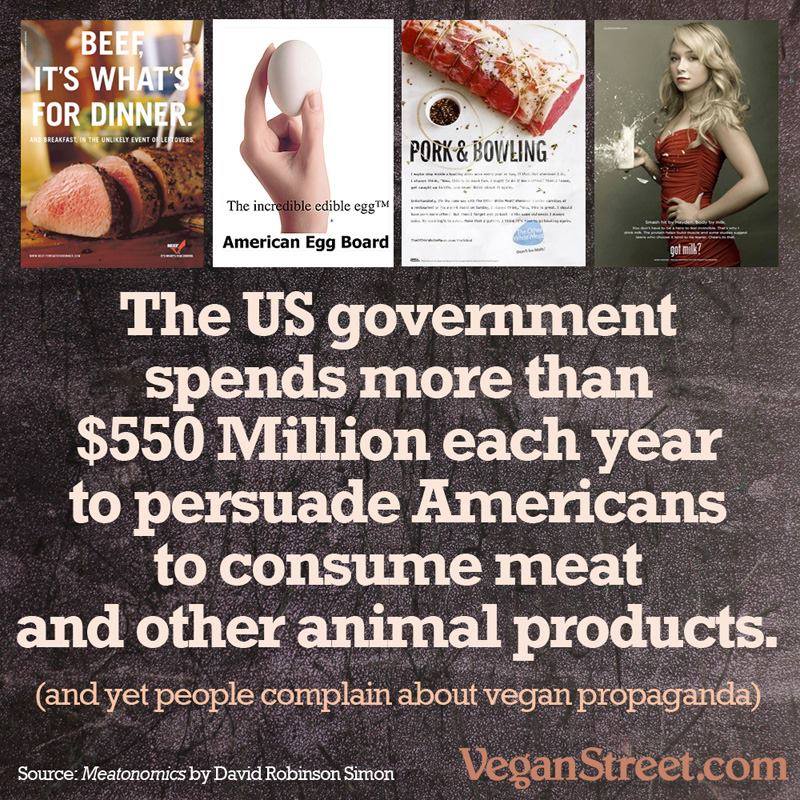
• While per capita poultry consumption has increased, the majority of meat consumed is still red meat (beef, pork, lamb), and nearly a quarter is processed meat (hot dogs, bacon, sausages, deli meats, etc.).
• Meat can be a good source of protein and other essential nutrients, but most Americans eat more than 1.5 times the average daily protein requirement, and consume more than the recommended amount of foods from the USDA Protein Foods group.
• The majority of the protein foods consumed in the U.S. are meat and animal products, which are often high in saturated fat and cholesterol, as opposed to the more nutrient-dense and health-promoting plant-based options (e.g., beans, peas, lentils, soy products, nuts and seeds). Typical American diets also fall significantly short of meeting recommendations for vegetables, fruits, and whole grains.
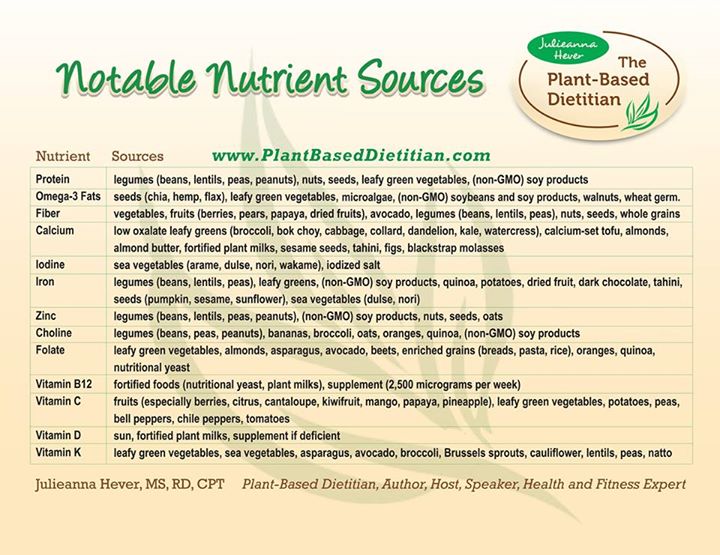
• A strong body of scientific evidence links excess meat consumption, particularly of red and processed meat, with heart disease, stroke, type 2 diabetes, obesity, certain cancers, and earlier death. Diets high in vegetables, fruits, whole grains and beans can help prevent these diseases and promote health in a variety of ways.

• Why does meat increase health risks? Studies give several reasons: high saturated fat and cholesterol content, high energy density, carcinogenic compounds found in processed meat and formed during high-temperature cooking, a compound called L-carnitine in red meat that may promote plaque build-up in the arteries, and the lack of health-protective plant foods in high-meat diets.
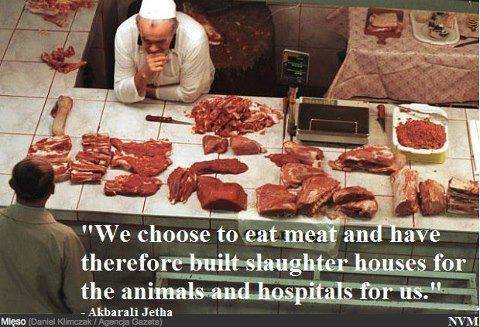
• While there is no specific federal guidance on the type or amount of daily meat consumption, key recommendations in the 2010 Dietary Guidelines include choosing a variety of protein foods, increasing the amount and variety of seafood consumed, reducing saturated fat intake, and increasing fruit and vegetable intake. Americans have sufficient flexibility in their diets to reduce meat consumption while making space for nutrient-rich, plant-based alternatives.
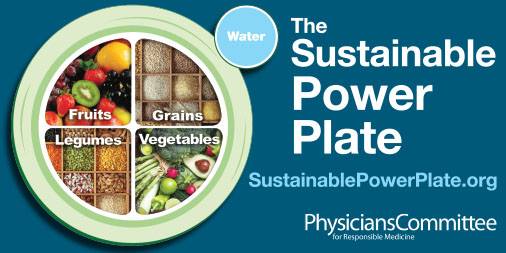
Meat Production: Public Health Concerns, from Farm to Fork
• Almost all of the meat, dairy products, and eggs produced in the United States come from industrial food animal production (IFAP) operations that confine thousands of cattle, tens of thousands of pigs, or as many as hundreds of thousands of chickens at a single facility — and produce enormous amounts of animal waste. IFAP raises serious public health concerns for industry workers, rural communities, consumers of animal products, and the general public.
• Feed additives: The feed given to industrially-raised cattle, hogs, and poultry is specially formulated to maximize production at the lowest possible cost. These feeds may contain antibiotics, arsenical drugs, rendered animal carcasses, and other ingredients that may lead to the introduction of harmful contaminants into our food supply.
• Antibiotic resistance: Antibiotic drugs have been called the “health care miracle of the last 500 years.” IFAP practices are eroding the effectiveness of these life-saving drugs: The routine use of low doses of antibiotics in feed contributes to the development of antibiotic-resistant bacteria. Antibiotic-resistant infections in humans are more expensive and difficult to treat.
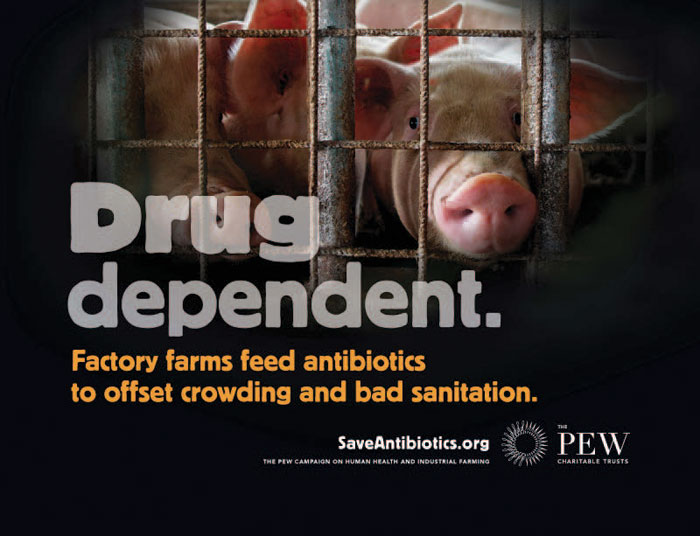
• Worker health: Workers in IFAP operations may face numerous hazards, including toxic gases from animal waste, and crowded, unsanitary conditions ripe for the transmission of diseases from animals to workers, who might then spread infections to their communities. Processing plant workers are often required to use sharp tools and heavy machinery, at high speeds and under hazardous conditions. Workers are at high risk for antibiotic-resistant infections, particularly if they incur cuts or scrapes. In many cases, workers lack the means to demand safer conditions.
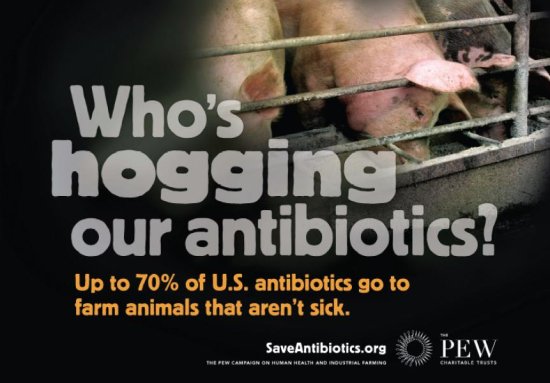
• Animal welfare: Animals raised in IFAP operations may be subjected to overcrowding, confined conditions that severely restrict movement, bodily alterations without pain relief, jolting during transport, feed deprivation, early weaning, and other physical and emotional harms. Practices that induce stress can increase animals’ transmission of disease — a concern for both human and animal health.
• Novel influenza: Frequent contact among large populations of hogs, birds, and humans — such as where industrial hog and poultry operations are sited in close proximity — offer ideal conditions for the generation of new influenza viruses. The influenza pandemic of 1918, responsible for more deaths than any other outbreak in human history, illustrates the potential implications of novel influenza.
• Animal waste: Manure is a valuable resource for promoting soil fertility, but the volume of waste generated by IFAP operations often overwhelms the capacity of nearby cropland to absorb it, leaving the excess to contaminate drinking water and waterways. As a result, downstream communities may be exposed to a range of groundwater contaminants, including nitrates, disease-causing organisms, and heavy metals. Nutrient runoff from animal waste and other sources has also been linked to the growth of toxic microorganisms in recreational waters. Concerns over toxic human exposure have prompted numerous closings of beaches and commercial fishing areas.
• Rural communities: People living near or downstream from IFAP operations may be forced to cope with the health and social impacts of contaminated air and water. Odors from nearby operations are more than just unpleasant smells; they have been associated with high blood pressure, depression, anxiety, sleep disturbances, and other harms. These and other impacts contribute to the social and economic decline of our nation’s rural communities.
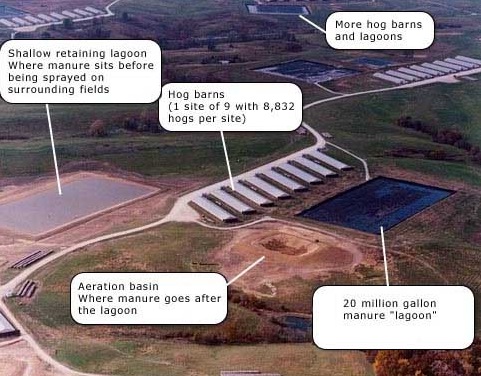
• Health disparities: In many cases, the burden of public health harms arising from IFAP falls disproportionately upon low-income communities and communities of color — populations already affected by poorer health status and lack of access to medical care.
• Foodborne illness: Disease-causing microorganisms originating in IFAP operations, including antibiotic-resistant pathogens, can enter our food supply at various points. When animal waste contaminates water sources, for example, contaminants can be transferred to plant surfaces when crops are irrigated. The scale and speed of meat processing plants also present frequent opportunities for widespread contamination.
Meat Production: Global and Ecological Concerns
• Industrial food animal production (IFAP) contributes to ecological harms that affect our land, air, and water. Raising animals for food also has implications for global climate change, and our capacity to feed a growing global population.
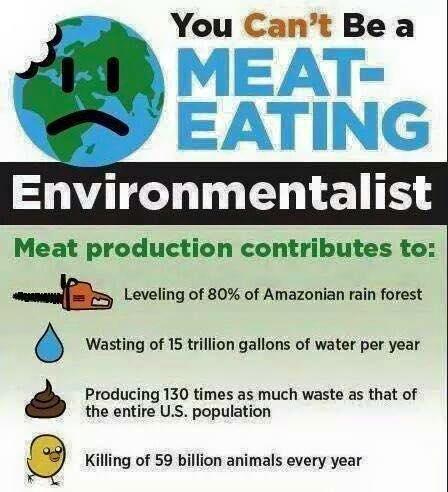
• Animal waste: Waste from IFAP operations can pollute waterways, contributing to “dead zones” that are devoid of most aquatic life. Manure spills from swine operations have also been implicated in outbreaks of toxic microorganisms that resulted in massive fish kills.
• Water use: Growing crops for animal feed entails a highly inefficient use of water, and places a strain on diminishing freshwater reserves. By some estimates, between 1,600 and 2,500 gallons of water are needed to produce one pound of feedlot beef. Globally, an estimated 27 percent of the water “footprint” of humanity is attributable to meat and dairy production.
• Climate change: Animal agriculture generates a significant amount of greenhouse gases that contribute to climate change, and the increased frequency and severity of flooding, droughts, and other weather events expected to follow. The production, processing, distribution and retailing of animal products in the United States accounts for an estimated 9 percent of total greenhouse gas emissions; worldwide estimates are closer to 15 percent. Major sources of emissions include cattle belching, animal manure, and synthetic fertilizers used to grow feed crops.
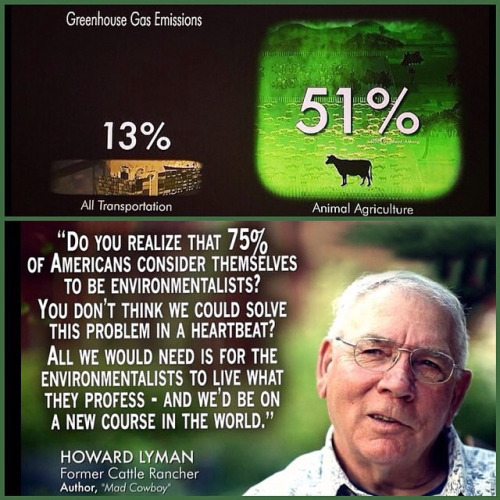
• Land use: Contrary to claims that IFAP is efficient, the vast majority of calories and protein in feed crops are lost when they are converted to animal products. Beef production is particularly inefficient; per unit of meat, cattle consume on average three times as many calories from feed compared to hogs and poultry.
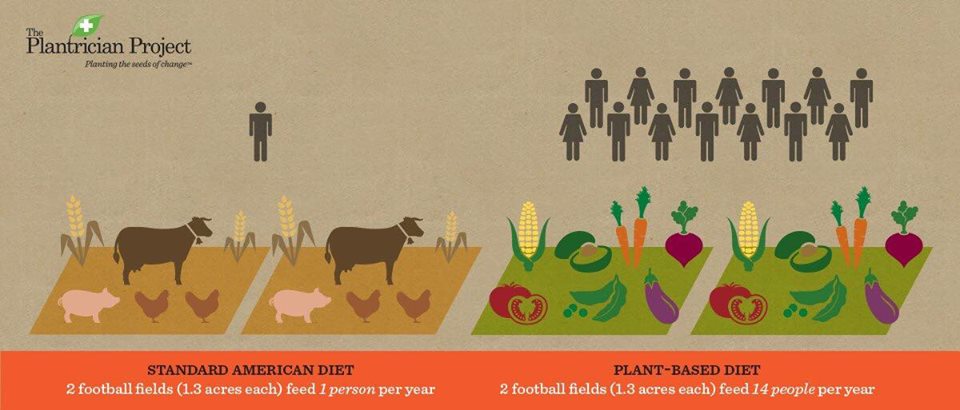
• Global food security: By some estimates, global food production would need to double by 2050 if we expect to feed the growing population. The prospect of attaining this goal is severely limited by the amount of agricultural land devoted to raising animals for food. In North America, for example, only 40 percent of cropland is devoted to growing food for direct human consumption; the bulk of the remainder is devoted to feed crops.
Read the original article with all citations indicated HERE.
Additional Comments from Global Health Organizations
American Dietetic Association:
“It is the position of the American Dietetic Association that appropriately planned vegetarian diets, including total vegetarian or vegan diets, are healthful, nutritionally adequate, and may provide health benefits in the prevention and treatment of certain diseases. Well-planned vegetarian diets are appropriate for individuals during all stages of the life cycle, including pregnancy, lactation, infancy, childhood, and adolescence, and for athletes.”
British Dietetic Association:
“Well planned vegetarian diets can be both nutritious and healthy. They have been associated with lower risks of heart disease, type 2 diabetes, obesity, certain types of cancer and lower blood cholesterol levels.”
Dietitians Association of Australia:
“Vegan diets are a type of vegetarian diet, where only plant-based foods are eaten. They differ to other vegetarian diets in that no animal products are usually consumed or used. Despite these restrictions, with good planning it is still possible to obtain all the nutrients required for good health on a vegan diet.”
Dietitians of Canada:
“A vegan eating pattern has many potential health benefits. They include lower rates of obesity, heart disease, high blood pressure, type 2 diabetes and certain types of cancer. Other benefits include lower blood cholesterol levels and a lower risk for gallstones and intestinal problems. Vegans must make sure that enough nutrients like protein, iron, zinc, calcium, vitamins D and B12 and omega-3 fats are included. A well planned vegan diet can meet all of these needs. It is safe and healthy for pregnant and breastfeeding women, babies, children, teens and seniors.”
The American Cancer Society
“Some studies have linked vegetarian diets to lower risk for heart disease, diabetes, high blood pressure, obesity, and certain types of cancer, such as colon cancer. A strictly vegetarian diet must be properly planned to be sure it provides all the required nutrients.”
Harvard School of Public Health:
“With a little planning, a balanced and varied vegetarian diet can meet the nutrient needs of nearly everyone.”
Cleveland Clinic:
“There really are no disadvantages to a herbivorous diet! A plant-based diet has many health benefits, including lowering the risk for heart disease, hypertension, Type 2 diabetes, and cancer. It can also help lower cholesterol and blood pressure levels, plus maintain weight and bone health.”
New York Presbyterian Hospital:
“People who follow a vegetarian diet are relatively healthier than those who don’t. Vegetarians tend to have a lower incidence of obesity and fewer chronic health problems, including some cancers, heart disease, high blood pressure, and diabetes.”
The Ronald Reagan UCLA Medical Center (UCLA):
“Some of the health benefits of a vegetarian diet may include: [d]ecreased blood cholesterol levels;and blood pressure; [l]ower incidence of heart disease, some forms of cancer, and digestive disorders like constipation and diverticula disease; [l]ower incidence of obesity and some forms of diabetes.”
The Perelman School of Medicine (Penn Med):
“A well-planned vegetarian diet can give you good nutrition. A vegetarian diet often helps you have better health. Eating a vegetarian diet can help you: [r]educe your chance of obesity; [r]educe your risk of heart disease; [l]ower your blood pressure; [l]ower your risk of type 2 diabetes.”
The Permanente Journal:
“Healthy eating may be best achieved with a plant-based diet, which we define as a regimen that encourages whole, plant-based foods and discourages meats, dairy products, and eggs as well as all refined and processed foods. We present a case study as an example of the potential health benefits of such a diet.
Research shows that plant-based diets are cost-effective, low-risk interventions that may lower body mass index, blood pressure, HbA1C, and cholesterol levels. They may also reduce the number of medications needed to treat chronic diseases and lower ischemic heart disease mortality rates. Physicians should consider recommending a plant-based diet to all their patients, especially those with high blood pressure, diabetes, cardiovascular disease, or obesity.”
“A well-planned vegetarian diet can meet the needs of people of all ages, including children, teenagers, and pregnant or breast-feeding women. The key is to be aware of your nutritional needs so that you plan a diet that meets them.”
“These are the top 15 causes of death, and a plant based diet can prevent nearly all of them, can help treat more than half of them, and in some cases even reverse the progression of disease, including our top three killers.”
Walter Willet, the Chair of Harvard’s nutrition department:
“Humans have no nutritional requirement for animal milk, an evolutionarily recent addition to the diet,” Willett and his co-author, David Ludwig, of Boston Children’s Hospital, wrote in an article published last September in the journal,
JAMA Pediatrics.
“… the recommendation for three servings of milk per day is not justified and is likely to cause harm to some people. The primary justification is bone health and reduction of fractures. However, prospective studies and randomized trials have consistently shown no relation between milk intake and risk of fractures. On the other hand, many studies have shown a relation between high milk intake and risk of fatal or metastatic prostate cancer, and this can be explained by the fact that milk intake increases blood levels of IGF-1, a growth-promoting hormone.”

{ 4 comments… read them below or add one }
You make some good points in regards to the feed and especially heavy antibiotic use in animals and it severely is affecting humans health. Protein how ever is essential to human life and I just don’t think plants provide enough or even all the required aminos we need. I have been eating a ketogenic diet for 7 years which is really high in saturated fat and all health markers dramatically improved. Well written and thought out article though.
Hi Travis, animal protein is not essential to human life. Even though your health has improved on a ketogenic diet, there is still no other way of eating that supports human health, planetary health, AND animal vitality than a vegan diet. The way we eat doesn’t only impact us, it impacts the planet and other living beings who have a right to be here. I did not write this article. All the words were provided by Johns Hopkins. I simple added the images. There is no human nutritional need for animal flesh, milk, or eggs. Everything in an animal’s body we can get directly from the earth and sun as they did. Thank you for taking the time to read and comment!
Click: Nutrition Only in Animal-Based Foods
Ketogenic for 7 years? Be careful. Dr. Atkins died of a heart attack. Recent meta-analyses link low carb diets to all-cause mortality. Check out PubMed at NIH and search “mortality” and “low carb” for yourself. Your markers can improve but at a big cost to other disease processes not measured, like inflammation and others. Have you tried a whole food, plant-based diet?
Thank you for adding these notes, Kelly!